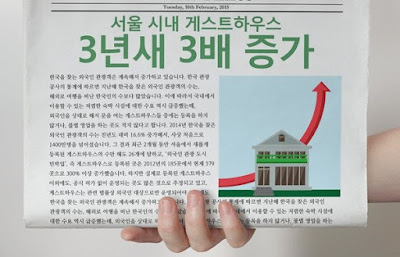넘어섰다고 한다. 그 중 미국 이민자는 전체의 54%인 11만 2천394명으로 1위를 차지하고 있다. 이민자의 대부분은 처음에는 적응을 하지 못해 힘들어 한다. 미국에 온 지 20년이 된 한 이민자의 말이다. 유영민(58세) “한국에서 영어 공부를 하고 오기는 했지만 미국 생활이 쉽지는 않았습니다. 슈퍼마켓에 가서 물건을 살 때도 잘못 산 적이 많았죠. 영어를 잘하지 못해 일자리를 찾는 것도 어려웠어요. 그래도 꿈을 잃어버리지 않고 열심히 노력했어요. 대학교도 졸업하고 회사에도 취직하면서 점점 미국 생활이 좋아졌습니다. 같은 직장에서 착하고 예쁜 여자를 만나 결혼도 했고요.” 이들은 이민을 희망하는 사람들에게 다음과 같이 말했다. 처음에는 힘들지만 꿈과 성실한 노력이 있다면 반드시 이겨낼 수 있다고…
According to the recent announcement of a Korean government organization, more than 200,000 people have been reported to move abroad from Korea for the last 10 years. Among them, emigrants to America are ranked first with 112,384 people, taking up 54% of the total [number of the emigrants]. Most of the emigrants have hard time at first because they cannot adapt [to newcircumstances]. This is a story of an emigrant who went to the States twenty years ago. Youngmin Yu (age 58) “I studied English in Korea and came to the States, but life in the States was not easy. There were lots of times that I bought wrong things in a Supermarket. It was hard to find a job because I could not speak English well. But I did not lose my dream and tried hard. My life in the States was getting better as I graduated from the university and got a job. I met a nice and pretty woman at work and got married. The emigrants advised to those who wish to emigrate as follows. It is hard at first, but they can overcome the difficulties if they maintain their dream and earnest efforts…
이민 생활(Immigration)
넘어섰다고 한다.
According to the recent announcement of a Korean government organization, more than 200,000 people have been reported to move abroad from Korea for the last 10 years.
-을 위해서(idiom(for))
최근(recent)
한국 정부 기관의: 한국 정부 기관(a Korean government organization)+-의(possessive marker)
발표(announcement)
-에 따르면(idiom; according to))
지난(last)
10년간: 10(ten)+ 년(years)+ 간(for)
해외로(abroad)
이주한: 이주하(다)(to move)+-ㄴending (relative clause; noun modifying)
넘어섰다고 한다: 넘어서(다)+-었-(pre-ending(past tense))+-다고 하(다) (quotative(declarative))+-ㄴ다(ending(declarative))
Among them, emigrants to America are ranked first with 112,384 people, taking up 54% of the total [number of the emigrants].
미국 이민자는: 미국 이민자(emigrants to America)+-는(marker(comparison))
전체의: 전체(total)+-의(possessive marker)
54%인: 54%이(다)(to take up 54%)+ㄴ(ending(relative clause; noun modifying))
11만 2천394명으로: 11만 2천 394명(112,384 people)+-으로(marker(with))
1위를: 1위(first)+-를(objective marker)
차지하고 있다: 차지하(다)(to be rank)+-고 있다(modal aux.( to be doing))
Most of the emigrants have hard time at first because they cannot adapt [to new circumstances].
대부분은: 대부분(Most of)+-은(marker(exclusion))
처음에는(at first)
적응을 하지 못해: 적응을 하(다)(to adapt)+ -지 못하(다) not+-해(connective; because)
힘들어 한다: 힘들 어 하(다)(to have hard) +-ㄴ다(ending(declarative))
This is a story of an emigrant who went to the States twenty years ago.
한(a/an)
말이다: 말(a story)+-이다(ending(to be: declarative))
Youngmin Yu (age 58) “I studied English in Korea and came to the States, but life in the States was not easy.
58세: 58 세(age 58)
한국에서: 한국(Korea)+-에서(marker(in))
오기는 했지만: 오(다)(to come)+-기는 하(다)(modal aux.(to stress))+-했-(pre-ending(past tense))+-지만(connective; but)
미국 생활이: 미국 생활(life in the States)+-이(subjective marker)
쉽지는 않았습니다: 쉽(다)(to be easy)+-지는 않(다)(not)+-았-(pre-ending(past tense))+-습니다(ending(declarative))
There were lots of times that I bought wrong things in a Supermarket.
가서: 가(다)(to go)+-아서(connective; because)
물건을: 물건(things)+-을(objective marker)
살 때도: 사(다)(to buy)+-을 때(conjunctive; when)+-도(marker(also))
잘못(wrong) 산 적이: 사(다)(to buy)+ -ㄴ 적이(to experience)
많았죠: 많(다)(to be lots of times)+-았-(pre-ending(past tense))+-지요(ending(for insisting with speaker’s strong conviction))
It was hard to find a job because I could not speak English well.
일자리를: 일자리= 직장(a job)+-를(objective marker)
찾는 것도: 찾(다)(to find)+-는(ending (relative clause; noun modifying))+것(thing)+-도 (marker(also))
어려웠어요: 어렵(다)(to be hard)+-었-(pre-ending(past tense))+-어요(ending(polite))
But I did not lose my dream and tried hard.
꿈을: 꿈(my dream)+-을(objective marker)
잃어버리지 않고: 잃어버리(다)(to lose)+-지 않(다)(not) +-고(connective; and)
노력했어요: 열심히 노력하(다)(to try hard)+-했-(pre-ending(past tense))+어요(ending(polite))
My life in the States was getting better as I graduated from the university and got a job.
졸업하고: 졸업하(다)(to graduate)+-고(connective ending: and)
회사에도: 회사+에+-도(marker(also))
취직하면서: 취직하(다)(to get a job)+-면서(connective; while)
미국 생활이: 미국 생활(my life in the States)+-이(subjective marker)
좋아졌습니다: 좋(다)(to be good)+ -해 지다(modal aux.( to express conditional change))
I met a nice and pretty woman at work and got married.
직장에서; 직장(work)+-에서(marker(at))
착하고: 착하(다)(to be nice)+-고(connective; and)
예쁜: 예쁘(다)(to be pretty)+-ㄴ(ending(relative clause; noun modifying))
여자를: 여자(woman)+-를(objective marker)
만나: 만나(다)(to meet)+-아(connective; and then)
결혼도 했고요: 결혼도 하(다)(to get married)+-했-(pre-ending(past tense))+-고요(ending(and<- connective))
The emigrants advised to those who wish to emigrate as follows.
이민을: 이민(emigration)+-을(objective marker)
희망하는: 희망하(다)(to wish)+-는(ending (relative clause; noun modifying))
사람들에게: 사람(those who)+-들(plural)+-에게(dative marker(to)
다음과 같이: 다음(as follows)+-과 같이 (idiom; like)
말했다: 말하(다)(to advise)+-했-(pre-ending(past tense))+-다(ending(declarative))
It is hard at first, but they can overcome the difficulties if they maintain their dream and earnest efforts…
처음에는: (idiom(at first))
힘들지만: 힘들(다)(to be hard)+-지만(connective; but)
꿈과: 꿈(dream)+-과(marker(and))
성실한: 성실하(다)(to be earnest)+-ㄴ(ending (relative clause; noun modifying))
노력이: 노력(effort)+-이(subjective marker)
있다면: 있(다)(to maintain)+-다면(connective; if)
이겨낼 수 있다고: 이겨내(다)(to overcome)+-ㄹ 수 있(다)(modal aux.(can))+-다고(quotative(declarative))
미주(in America)
재외동포일보(Overseas Koreans News)
앤드리아 류(Andria Ryu)

